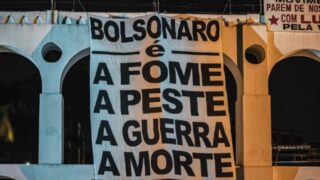Contradictory Brazilian decisions against priests and ministers demonizing Afro-Brazilian movements test the grey area between freedom of expression and hate speech.
by Massimo Introvigne


One religionist’s freedom of expression is another religionist’s hate speech. This is a very delicate area of law, since religious controversy has traditionally used harsh expressions, which today may fall under the broader category of hate speech.
The European Court of Human Rights had ruled in the past that calling a religious movement a “cult” is not forbidden. However, in the 2022 “Tonchev” decision it has reversed its past case law and has stated that “cult” and similar expressions may promote discrimination and violence. “Tonchev” prohibited governments and state authorities from designating religious minorities as “cults,” but left open the question whether similar expressions may be used by non-state actors in private controversies.
Certainly, religions have called each other “false” and “heretic” for centuries. We live in an era of interreligious dialogue and civility, but conservative groups remain outside of it. Christians find in the Bible, in the Book of Psalms, no. 96 in the Jewish-Protestant edition and no. 95 in the Greek, traditional Catholic, and Eastern Orthodox versions, that “omnes dii gentium demonia,” as the Vulgata translated it, “all the gods of the heathen are demons.” While new translations tend to translate non-literally “demons” with “idols,” not to offend non-Christians, conservative priests and pastors maintain that “demons” is the right word.
If one interprets the Biblical passage—which scholars explain historically within the context of the wars between the Israelites and their neighbors—in its literal sense, it can be easily concluded that all those outside the Jewish-Christian tradition worship “demons.”
This is a conclusion conservative Christian ministers have come to when dealing with Afro-Brazilian religions. While the Catholic Church and liberal Protestant churches now treat these religions with respect, many Evangelicals maintain they are “demonic.” Some conservative Catholic priests also do not follow the pro-dialogue instructions of their bishops. Sometimes, the matter reaches courts of law.
Aijalon Florêncio, an evangelical pastor from Pernambuco criticized Afro-Brazilian murals painted in the Tunel da Abolição in Recife in 2021. He posted on Instagram that Afro-Brazilian religions such as Candomblé and Umbanda pay “reverence to evil, satanic entities, spirits of darkness.” He insisted that “entities worshipped within mythology, even within religions of African origin, are demons,” and that “Satan is trying to establish portals to enslave, imprison, and intoxicate our lives and cities.”


Afro-Brazilian devotees felt offended, and Florêncio was incriminated for hate speech. He was arrested in April 2023 and prosecuted. The fact that he also offended the homosexual community might have been a factor in his arrest. He has been sentenced for his offenses to Afro-Brazilian religions to two and a half years in jail, although freed on bail on the conditions that he pays a heavy fine equivalent to U.S. $20,000 and deletes the offending remarks from social media.
Florêncio and some fellow Evangelicals complained that a different standard was used for a Catholic priest, Father Jonas Abib, that the Supreme Court found in 2016 not guilty of hate speech for having suggested that Satan may be at work in Spiritualism and Candomblé. In a 4-1 decision, the Supreme Court found that the expressions used by Father Abib were “intolerant, pedantic, and arrogant,” and deserved “moral and ethical” condemnation but were part of freedom of expression, which should be broadly interpreted in cases of religious controversy.
Evangelicals argued that, “Those who believe that their religion is true would, in the vast majority of cases, claim that the other religions are not only ‘worse,’ but that they are false.” Popular Evangelical theologian Yago Martins went one step further, and perhaps exposed himself to prosecution, by stating that, “Any religion other than Christianity is false. Every sacrifice made to other gods is made to demons. In Islam, they worship demons. In Candomblé, they worship demons. In Umbanda, they worship demons. If every pastor is going to be arrested for preaching what the Bible says, let them arrest us all.”
As I said, one religious leader’s religious liberty in criticizing other religions is another’s hate speech. The border is not well defined by the law, and difficult to grasp. These cases can only be decided on a case-by-case basis and taking context into account. Perhaps a Catholic priest in 2016 was treated in a kindlier way by Brazilian courts than an Evangelical minister in 2023. But it is also possible that Brazilian judges are taking into account the widespread violence and discrimination against Afro-Brazilian religions, fueled by hate speech, prevailing in Brazil in the last few years.









